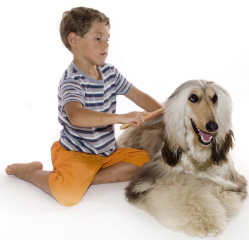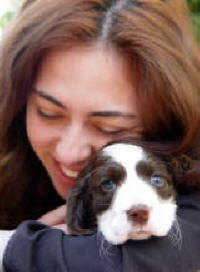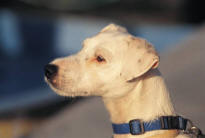|
 Welcome
To Positive Dog Parenting™ Welcome
To Positive Dog Parenting™
Just as a human traveler might unintentionally
offend or confuse a person from a different culture,
it is possible to actually CAUSE problems in our
pets when
simply doing what seems most natural to us as
individual pet owners. What we need to remember is this; as much as pets are like us, we do have
species-specific behaviors.
Here's the good news! Given new
information, we can modify our behavior, which changes the perception of the
pet, which increases the pet's learning and our potential for love, joy, and satisfaction in the
relationship!
If you have a
new puppy, you essentially have "wet clay" to mold
in your efforts to raise your ideal adult
dog. Pups are in their critical socialization and
optimal learning period from ages 1 to 4 months old.
Older pups are more like working with dry clay and
adult dogs more like chiseling marble. Can marble be
chiseled? How would Michelangelo answer
that question?
.jpg) Most
Important Rules with a New Puppy Most
Important Rules with a New Puppy
-
Prevent
bad habits. Provide constant supervision
indoors until ALL house rules are learned. Keep
the puppy in a kennel when you can't supervise.
Try keeping the pup with you on leash indoors.
-
No spanking or any kind.
If the pup is "caught in the act" interrupt,
consider a 3 minute "time out"
then forgive.
-
Establish
consistent "house rules" by praising behaviors
you DO want and ignoring or redirecting
behaviors you do NOT want.
-
Exercise your pup daily, introducing new people
and animals by YOU acting friendly and approaching
them first. It is never too late to teach a
dog a new set of rules.
Learn to Earn
.jpg)
The best way
to establish your leadership and role as teacher
with your puppy is
to start right away with the "learn to earn" principle. Your
pup will learn from you when he or she realizes that
YOU control ALL the valuable
resources and that
nothing is for free! This is simple to do but
does require being consistent. Before you give the
pup ANY privilege such as a meal, walk, toy,
passage through a door (in or out), petting,
brushing, prolonged eye contact, or praise, SIMPLY
ask the pup to do something FIRST such
as "sit", THEN give the pup something valuable.
Food Rewards
NEVER hit or
punish a puppy. Be the provider of everything good
and nothing bad. If you see the pup doing
something wrong, ask yourself, what
would be right? Make it in the
pup's best interest to do what is right by
giving lavish praise and treats. Use
words to give
corrections
such as "off" to get
off a couch or you! Use
the word, "quiet" to teach the dog to stop excessive
or inappropriate barking. As the pup gets older and
wiser, you can begin to phase food treats
out. NEVER phase out praise or using privileges as
rewards for good behavior. Would you work if
you were never paid?
Housetraining
Supervise
the puppy at all times. If the pup begins to
eliminate in the home, swiftly pick the pup up and
carry him out to the right area, then praise. The best way
to teach your pup not to eliminate in the home is
through supervision and contented confinement.
Contented confinement includes positive kennel training and
close tethering. When done correctly,
elimination training takes one to two weeks.
Remember input equals output.
Feed and water your pup twice daily during
elimination training. Take your pup to the
designated toilet area and give a cue such as "get
busy". Praise softly as the pup eliminates. Upon
completion, make a big fuss over the pup's success
and give a food treat.
Teaching the Pup to Come to You
One of the
most common reasons for pups or dogs to stop coming
when called is due to punishment by the owner. This
punishment generally occurs when the pup does not
come quickly enough. People also punish the dog
accidentally after saying, "come" by doing something
perceived by the dog as unpleasant. ALWAYS make coming
to you a positive and bonding experience between you
and the
dog.
To teach the word,
"come", begin with a hungry pup. Put a piece of dog
kibble in front of the pup's nose, say the pup's
name and the word, "come" in a happy voice. Then
move backwards, keeping the food in front of the
pup's nose. The pup has a natural chase instinct and
will follow. Praise following you and then give the
food as a reward. When the pup learns the word,
"come", call the pup from different parts of the
house or yard. Buddy up with another family member
and call the pup back and forth between you, giving
a treat each time. Practice "come" before every
meal.
Early Socialization
The earlier
you start puppy socialization the better. Early
socialization helps you raise a puppy and future adult dog
that is friendly and flexible rather than fearful or
aggressive to other animals and people of all ages.
.jpg) The Earlier
the Better... The Earlier
the Better...
-
Enroll
your pup in an off leash puppy socialization
class.
-
Host a
puppy party.
-
Provide
your pup with 1 - 3 days of weekly
puppy daycare.
-
Use the ABN
Socialization Checklist to give your pup early, positive
experiences that will last a lifetime. You don't get
a second chance to make a first good impression!
Household Manners
Use
words to give
corrections
to teach the pup to get off a couch or you! Use
the word, "quiet" to teach the dog to stop excessive
or inappropriate barking. If the pup begins to
eliminate in the home, swiftly pick the pup up and
carry him out to the right area, then praise. As the pup
gets older and wiser, you can begin to phase food
out. NEVER phase out praise or using privileges as
rewards for good behavior. Would you work if
you were never paid?
House Rules
Teach your
puppy the rules you want for the adult dog. Do not
let the pup up on furniture or allow jumping up on
you NOW if you do not want this behavior LATER. Teach the
puppy
gentle mouthing
NOW to prevent hard bites LATER. Teach the
puppy to chew on the
right things and to play nice NOW with praise
and attention. IGNORE or give time outs for
misbehavior.
 Identification Identification
Start your
pup with a nylon collar
with an identification tag
attached. Put your last name and two or three phone
numbers on the tag. You don't want to put the pup's
name or your address
on the tag to prevent someone bonding to
your pet or burglarizing your home. The best time to
ID chip or tattoo your pup is while your pup is
under anesthesia for a spay or neuter
at 4 to 6
months of age. For older, unruly pups, use a
head
halter instead of a collar for natural, effective
control.
www.AnimalBehavior.Net
- Improving the Relationships Between Pets and
People
Copyright
©
2001-2008 All Rights Reserved Dr. Rolan and Susan
Tripp | Animal Behavior Network & Affiliates
The content of this web site is
copyrighted and content can only be copied or distributed through
video, print,
or the internet with paid Animal Behavior Network Membership and
Copyright information included.
|
|